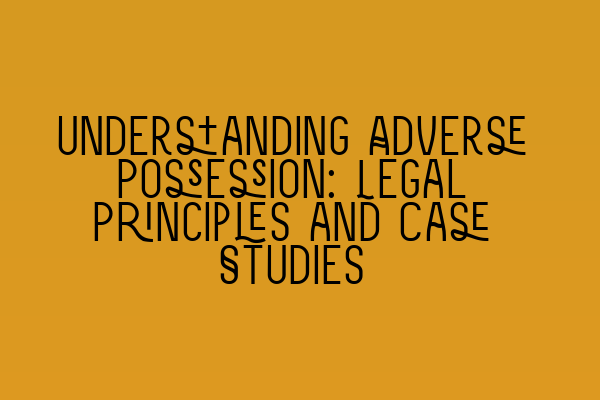Understanding Adverse Possession: Legal Principles and Case Studies
Introduction:
Adverse possession is a fascinating area of property law that can often lead to contentious disputes. It involves the legal principle of gaining ownership over someone else’s land through continuous and uninterrupted occupation for a specific period of time. In this blog post, we will explore the legal principles behind adverse possession, discuss relevant case studies, and highlight the important factors to consider when dealing with such cases. If you are preparing for your SQE exams, you can also check out these related articles on SQE 1 Practice Exam Questions, SQE 1 Practice Mocks FLK1 FLK2, SQE 2 Preparation Courses, SQE 1 Preparation Courses, and SRA SQE Exam Dates.
Legal Principles of Adverse Possession:
Adverse possession is primarily governed by the Limitation Act 1980. According to this Act, if someone occupies another person’s land without permission and without any legal right to do so, and their occupation meets certain criteria, then they may be able to acquire legal ownership of the land. These criteria typically include:
1. Continuous Possession: The occupier must have physically occupied the land without interruption for a specified period of time. This period is usually 10 or 12 years, depending on the circumstances.
2. Open and Notorious Possession: The occupation must be visible, obvious, and known to the true owner. It should not be a secretive occupation that hides the occupier’s intentions.
3. Adverse Possession as a Factual Possession: The occupier must have an intention to possess the land and exclude others from it. Mere presence or transient use of the land may not be sufficient to establish adverse possession.
4. Animus Possidendi: The occupier must have the intention to possess the land as an owner would, behaving as if they have full control and ownership over it.
Case Study: Smith v. Jones:
To illustrate the principles of adverse possession, let’s consider the case of Smith v. Jones. Mr. Smith, the true owner of a piece of land, left it unused and neglected for several years. Meanwhile, Mr. Jones, a neighboring farmer, started using a portion of Mr. Smith’s land for grazing his livestock.
Mr. Jones openly and continuously used the land for 12 years, taking care of it as if it were his own. Throughout this period, Mr. Smith never objected to Mr. Jones’ usage or attempted to reclaim possession of the land. At the end of the 12-year period, Mr. Jones claimed adverse possession of the land.
Upon examination of the case, the court found that Mr. Jones had satisfied all the criteria for adverse possession. His occupation was continuous, open, notorious, and had the required intention to possess. As a result, the court granted Mr. Jones legal ownership of the land.
Factors to Consider in Adverse Possession Cases:
When dealing with adverse possession cases, there are several factors to consider:
1. Knowledge of True Owner: It is essential to establish whether the true owner was aware of the occupation or whether it was hidden from their knowledge. This can affect the success of an adverse possession claim.
2. Disability of True Owner: If the true owner is suffering from a legal disability such as being a minor, mentally incapacitated, or serving in the armed forces, the limitation period for adverse possession may be extended.
3. Color of Title: This refers to a document, such as a flawed or invalid title deed, that the adverse possessor relies upon to assert their claim of ownership.
4. Willingness to Defend: The true owner’s willingness to defend their property rights and take legal action against the adverse possessor can also impact the outcome of an adverse possession case.
Conclusion:
Understanding the legal principles of adverse possession and studying case studies can provide valuable insights into this complex area of property law. It is important to remember that each case is unique and dependent on its specific circumstances. If you are preparing for your SQE exams, gaining a thorough understanding of adverse possession and related topics will be essential. You can further enhance your preparation by checking out resources such as SQE 1 Practice Exam Questions, SQE 1 Practice Mocks FLK1 FLK2, SQE 2 Preparation Courses, SQE 1 Preparation Courses, and SRA SQE Exam Dates.
Please note that the information in this blog post is for informational purposes only and should not be construed as legal advice. If you require assistance with an adverse possession case or any other legal matter, it is recommended to consult with a qualified solicitor.
